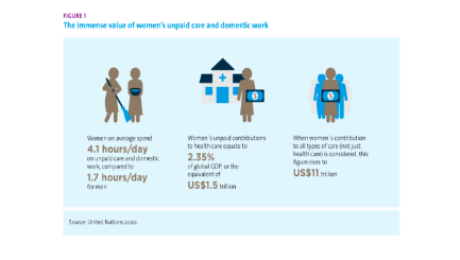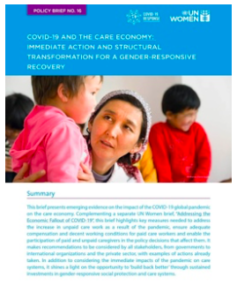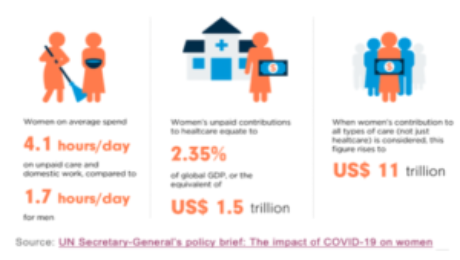COVID-19 AND THE CARE ECONOMY: UN Women calls for immediate action and structural transformation for a gender-responsive recovery
A recent brief from UN Women presents emerging evidence on the impact of the COVID-19 global pandemic on the care economy.
Evidence suggests that the rising demand for care in the context of the COVID-19 crisis and response will likely deepen already existing inequalities in the gender division of labor, placing a disproportionate burden on women and girls. Not only are women over-represented among paid health care workers, girls and women also shoulders the bulk of unpaid care and domestic work that sustains families and communities on a day-to-day basis.
School closures and household isolation across the globe are moving the work of caring for children from the paid economy—schools, day-care centers, and babysitters—to the unpaid economy. So far, 1.27 billion students (72.4 percent) across 177 countries have been affected by school closures (UNESCO). The lack of childcare support is particularly problematic for essential workers, including those in the health sector, who have care responsibilities.
This brief recommends ways to transform care systems now and for the future – both the need for immediate support and the need for sustained investment in the care economy for long term recovery and resilience.
How to Transform Care Systems – Now and for the future
(UN Women, 2020)
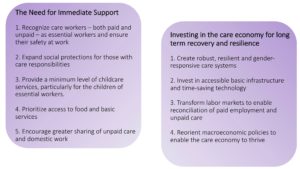
Authors/editor(s): Bobo Diallo, Seemin Qayum, and Silke Staab 2020
- Published in COVID 19, Policy Briefs & Reports, UN Women
UN Women: COVID-19 and the Crisis of the Care Economy
In a recent UN Women blog post, Silke Staab explores ways in which the COVID-19 pandemic that has swept the globe is further compounding the risk and strain put upon women in the care economy – both paid and unpaid.
Women comprise 70% of health workers globally and even higher shares of care-related occupations such as nursing, midwifery and community health work, which all require close contact with patients. The risks these front-line workers take to save lives are compounded by poor working conditions, low pay and lack of voice in health systems where medical leadership is largely controlled by men.
It is estimated that unpaid health care, in which the burden primarily fall onto women, is equivalent to a staggering $1.5 trillion globally. When factoring in all other types of care work, that figure climbs to $11 trillion. Furthermore, community health workers that receive no compensation, again mostly comprised of women, are vital to the health and wellbeing of communities all over the world. These care workers are in desperate need of proper equipment, training and financial support in the face of this current pandemic.
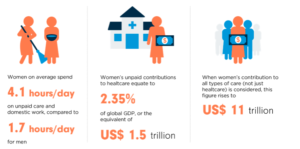
Source: UN Secretary-General’s policy brief: The impact of COVID-19 on women
The increased burden of childcare due to school closures and social distancing is also bound to negatively affect the well-being of the women taking on these tasks. This is further exacerbated by the loss of assistance from elders in the family, who must keep themselves protected from COVID-19 due to being in a vulnerable category.
On the flip side of that is the reliance of elderly people on the informal care of their family members, but this reliance puts them at greater risk of being exposed. Providing these family care workers with the proper assistance and protective gear in order to continue their duties while minimizing the risk to their loved ones is an essential first step in facing this particular challenge.
Although this pandemic has caused an immense strain on the care economy, the situation has created an opportunity to reevaluate priorities and reassess the economic value of these essential services being provided through care work. A people-centered plan for economic recovery should take this into account and prioritize long-overdue investments in the care economy.
Silke Staab is a research specialist at UN Women.
This blog was originally posted on the UN Women website on April 22, 2020. Read this blog post here.
- Published in COVID 19, Gender Inequalities, UN Women

